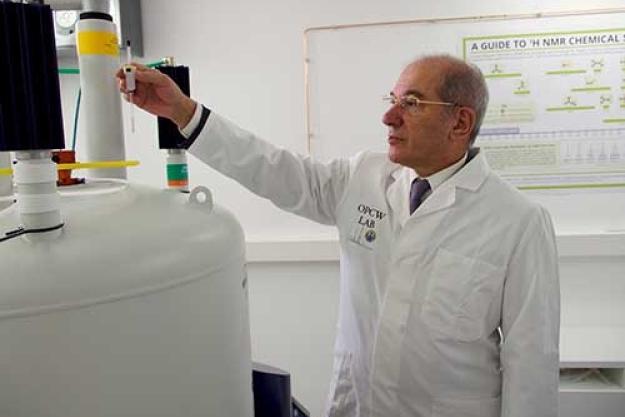
OPCW Director-General Ahmet Üzümcü at the inauguration of the new Nuclear Magnetic Resonance (NMR) Spectrometer at the OPCW Laboratory in Rijswijk.
THE HAGUE, Netherlands — 17 March 2017 — The Director-General of the Organisation for the Prohibition of Chemical Weapons (OPCW), Ambassador Ahmet Üzümcü, yesterday inaugurated the new Nuclear Magnetic Resonance (NMR) Spectrometer at the OPCW Laboratory in Rijswijk.
After participating in a live demonstration of the instrument, the Director-General explained that it was vital that the Technical Secretariat of the OPCW keeps apace with advances in science and technology. With this in mind, “the Technical Secretariat of the OPCW, with the support of our Member States, continues to make investments into state-of-the-art analytical equipment to maintain and enhance our capabilities,” the Director-General said.
The instrument – A Bruker 400 MHz Avance III HD-Nanobay with Prodigy Cryoprobe – expands the Laboratory’s capabilities to elucidate structures and identify unknown chemicals in samples. Moreover, it will allow for rapid determination of the purities of reference chemicals and products of in-house synthesis. Apart from these more routine tasks, it will facilitate research into NMR based chemical forensic techniques and attribution analysis.
NMR is a powerful and versatile technique used widely in chemistry and the life sciences, with applications ranging from the identification of small molecules to the determination of protein’s three-dimensional structures. NMR is best known for its application in medical magnetic resonance imaging (MRI).
The importance and impact of NMR is demonstrated by six Nobel Prizes that have been awarded so far in the fields of chemistry, physics and medicine for either development of NMR techniques or NMR application to scientific problems.
Background
As the implementing body for the Chemical Weapons Convention, the OPCW oversees the global endeavour to permanently eliminate chemical weapons. Since the Convention’s entry into force in 1997 – with its 192 States Parties – it is the most successful disarmament treaty eliminating an entire class of weapons of mass destruction.
To date, nearly 95 per cent of all chemical weapon stockpiles declared by possessor States have been destroyed under OPCW verification. For its extensive efforts in eliminating chemical weapons, the OPCW received the 2013 Nobel Prize for Peace.
